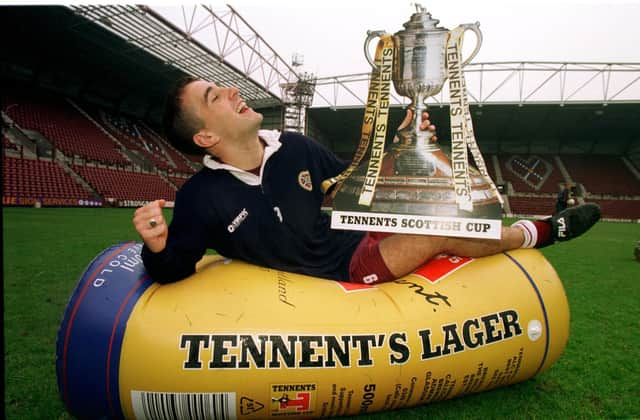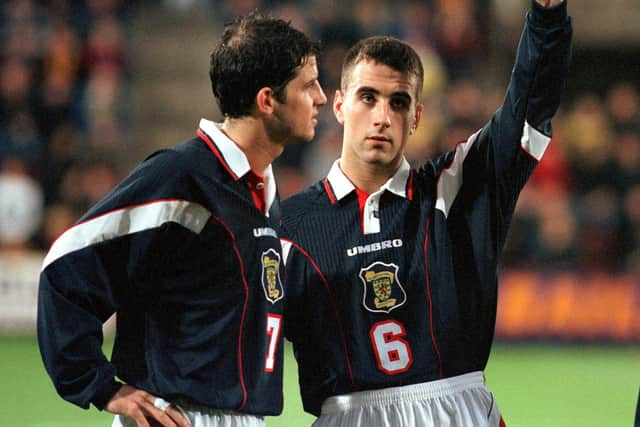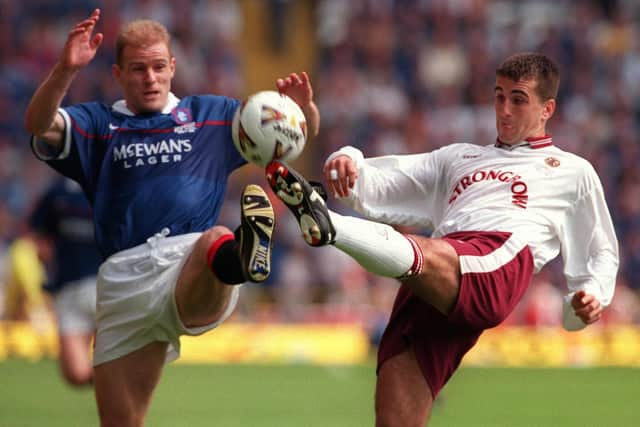'Hearts fans felt betrayed by me moving to Rangers and I understand that' - lot of what happened has never been told, says Paul Ritchie


Catching today’s Scottish Cup final will be trickier. When Rangers kick off against Hearts it’ll be 7am his time in the San Diego coastal town of Carlsbad as he readies himself for his job as a youth coach. “I’ve got games all day so will manage to see the first half from Hampden and then hopefully find a driver so I can carry on watching online,” he explains. “If there’s extra-time again I’m going to need regular updates and I really hope I get the news that the Jambos have won.”
Make no mistake: Hearts for Ritchie, now 46, represent the full enchilada. They were his team as a boy. His most treasured playing days were in the maroon. He would leave Hearts for Rangers in highly controversial circumstances and today looks back at that episode with regret. “I was young and I was naive. Hopefully by now most of the supporters will have forgiven me,” he says.
Advertisement
Hide AdAdvertisement
Hide AdYou would hope so. After all, it was almost back in the previous century. And Ritchie had already performed a key role in what for many still rates as the most treasured day in their fandom.


In 1998, not having won anything significant since Edinburgh belched unrestrained as Auld Reekie, Hearts lifted the Scottish Cup. Ritchie at centre-back was only 22 but tackled like a lion. Via Zoom’s tin cans on string, he reveals that his nickname in the dressing-room was “Mabawser”. How come? “You know: Mabawser Ritchie.” His Canadian wife Katie, just off screen in the kitchen, still doesn’t get it. So he demonstrates with a theatrical scratch.
Ritchie is a Fifer but owes his Gorgie allegiance to his paternal grandfather. “He worked on the railways and used to take me to see the trains. One day, 1980 when I was five, he said: ‘Let’s go in here.’ That was my first time at Tynie. I never looked at trains again!” Aged 11 he tried both Manchester clubs for size. Back in Glenrothes, before Mabawser, he was known as “Dopey” but suddenly there he was at The Cliff, Man U’s training base, encountering young David Beckham. A year later Ritchie became a junior Jambo.
Nurturing young talent for America’s MLS, Ritchie reflects on how player development has changed since his day. His soccer school is affiliated to the Real Salt Lake club and in the last few years half a dozen teenagers have graduated there, including Axel Kei, at 13 the youngest ever to win a league contract. For Ritchie growing up, football was “the be-all-and-end-all – it was all I did”. Now, other obsessions are available. And in the US there have always been other sports. Basketball and gridiron continue to hold a tight grip on young imaginations and dreams.
It’s a different time, for sure, and for Ritchie now a whole different milieu. “We’re drawing kids from a very, very nice area,” he says, “and some of them are brought up in a bubble. They need a reality check.” What, you wonder, would his proteges make of their coach’s indoctrination into life at Hearts? “When I left high school, pals said to me: ‘You’re so lucky, going off to be a YTS footballer.’ Well, myself and the other lads – Tommy Harrison, Marvyn Wilson, Anthony Smith, Gary O’Connor, a great group, with Sandy Clark as our ‘uncle’ – never saw a ball until Thursday. Kit needed to be washed and the dressing-rooms had to be spotless. The worst job, though, was sweeping the terraces after matches – and the worst bit was the old Shed. Thirty-thousand folk dropped, or flung in disgust at results, an awful lot of pies and in the winter they’d be frozen to the steps.”


Unable to afford the train fare from Glenrothes, young Ritchie stayed with his grandfather in Edinburgh’s Corstorphine and there was room in the house for another likely lad, Allan McManus, nicknamed “Chalkie”. The pair were near lookalikes and known around the club as “the Twins”. Any cases of mistaken identity? “Quite a few. Once, Chalkie smacked Ally McCoist, scraping right down his Achilles, and right after that Coisty twatted me with his elbow and split my eye open. But to be fair to Ally he called me a few days later to apologise, realising he’d gone after the wrong guy.”
But Mabawser and Chalkie almost never got as far as tangling with Rangers’ superstars, having distinctly failed to impress manager Tommy McLean. “He didn’t rate us one little bit. The only instruction I ever got from him at training was: ‘You – just win the ball and give it to Allan Johnston.’ He didn’t like my hair – it was too short. He picked Walter Kidd ahead of me and Zico hadn’t played for three years. I was sure me and Chalkie were for the off.”
Instead, McLean was sacked and in came Jim Jefferies. “The mood in the club was very low but Jim signed Gilles Rousset, Stefano Salvatori and Pasquale Bruno and the place got a huge lift.” Bruno, the Italian hatchet-man, was key to the development of Ritchie and McManus. “He became our mentor. He’d played at the highest level – Juventus, Torino – but he was a madman. So cool and calm – and so dirty! He added a nasty side to our games and showed us what it took to win.”
Advertisement
Hide AdAdvertisement
Hide AdIn Ritchie’s era Hearts won most of the Edinburgh derbies. From being a fan on the terraces – the incendiary clash immediately after Wallace Mercer’s failed takeover bid is a vivid memory – he loved the fixture and, from the far side of the world, will still scoff at any Hibee claims of superiority – “It’s ludicrous that they might think they’re the better team.” One defeat, though, still hurts, with a late season failure at Easter Road in 1998 blowing up Hearts’ hopes of the title. “I’m good friends with Kevin Harper and he’s always reminding me of that match and the winner he scored.”
Celtic with the Three Amigos – Pierre Van Hooijdonk, Jorge Cadete and Paulo Di Canio – were a nightmare for Ritchie. “I dreaded playing them. It was virtually impossible to get anything from those games.” But versus Rangers there was always a chance. He first turned out against them in December 1995, Paul Gascoigne netting the clincher, but a month later at Ibrox came a famous 3-0 victory. Hearts fans in the away corner remember Ritchie and McManus smiling and laughing. “We couldn’t believe it. A hat-trick for Sticky.” (Allan Johnston’s nickname – come on, keep up).
By 2000 Johnston and Ritchie would be back at Ibrox as Rangers men. Johnston had left Tynecastle two years before to play in France and England. Ritchie’s switch was a far messier affair, involving a rejected Rangers bid, a move on loan to Bolton Wanderers as his contract ran down and what fans suspected was going to be his inevitable arrival in Govan without his new club having to pay Hearts anything.
“A lot of what happened has never been told,” he says, “and I wish the whole affair had been handled better. I wasn’t offered a contract to stay at Hearts and Jim in sending me to Bolton did what he thought was right for the club. But it seemed to be the worst-kept secret [that he would end up at Rangers].”
Before he got there, and technically still a Hearts player, there was an interview in an Ibrox publication where he expressed admiration for Rangers. This will always irritate fans of other clubs who have their best players cherry-picked by the Old Firm – just ask Hibs supporters what they thought of a newspaper column by Kevin Thomson, since regretted and even disputed, where he enthused about his projected move to Govan. “I was naive but there was a genuine quote about Rangers being one of the biggest clubs in the world and how any Scottish player would at the very least be flattered to be linked with them and might well regard that as a dream move.
"I do think I was ill-advised. There was a lot of chirruping in my ear: ‘This is what you should do … Here’s what you’ll get.’ Obviously there were financial considerations. Listen, I know Hearts supporters: they love their club. They felt let down and even betrayed and I understood why.
“The worst of it was that I was only at Ibrox for 70 days. I’d been signed by, in effect, David Murray [being criticised for not having enough Scottish players at the club] and not [manager] Dick Advocaat who made it blatantly obvious he didn’t want me. I was sold to Man City for half a million and Hearts got nothing.”
Ritchie’s spell in England was variously good, bad, and injured. He’d enjoyed playing for Sam Allardyce at Bolton – “Old-school but also innovative.” Man City, bearing no relation to now, were a drinking club before Kevin Keegan, with his body as his temple, took charge. At Portsmouth his boss was another larger-than-life character, Harry Redknapp. Glamour team-mates at Derby County included Fabrizio Ravanelli.
Advertisement
Hide AdAdvertisement
Hide AdOf all clubs, Walsall helped him get back into the Scotland team. “Unfortunately this was the game we were hammered 4-0 by Wales. I’d played against [Cardiff’s] Robbie Earnshaw twice that season, winning both times, but against us he scored a hat-trick and got a £2.5 million move out of it. As they say, that’s football.” Ritchie turned out for his country seven times, the first a friendly win in Germany. He scored in his next outing, against the Czech Republic, and would have a fine match against that man Beckham.
Ritchie is not the first footballer to leave his boyhood favourites, only to discover that the grass is not always greener, and he won’t be the last. “You get caught up in wanting something better, or thinking that you do,” he says. “You forget how fortunate you’d been already in your career and that was me. I was always chasing something else but never found it, not appreciating it was on my own doorstep. Football after Hearts became more of a job whereas it had never been that at Tynie. So do I have regrets? Of course.”
But he’ll always have 1998. As his two sons back in Edinburgh, Jordan and Dylan, join the Hampden-bound maroon convoy on the M8, and as his parents David and Annie get ready to cheer on Hearts from Glenrothes, Ritchie is convinced that if the current team perform with the spirit shown by his side they’ll have a great chance of hoisting the trophy again.
He’d already played in two final defeats by Rangers which had reduced him to tears. “Was it written in the stars for the next time? I don’t know, but there was definitely a feeling: ‘We can do this.’ Before the final I was excited but also petrified, and that conflict of emotions is why we play football. We were up against a great Rangers team but it was the end of an era and they wanted to finish on a high. We scored early, they had to come at us and then we scored again. There wasn’t a lot of silky soccer and I had a right old tussle with [Gennaro] Gattuso. Rangers kept battering our defence but we just managed to stand firm.
“That was probably my best-ever game. Unfortunately my grandfather didn’t live long enough to see it. His ashes are scattered at Tynecastle and I’ll never forget the journey back to the stadium. Immediate post-match, catching up with the families, had been happy chaos. There was a moment on the team bus of complete silence. Everyone, at exactly the same time, seemed to have a wee quiet moment to themselves to reflect on what we’d done. Then Gary Locke made up a song about Jose Quitongo and got the whole coach laughing. Then, when we reached the outskirts of Edinburgh, we forced open the sunroof and climbed out onto the roof. Thankfully by then we were only travelling at five miles an hour. There were just so many folk out on the streets to welcome us home.”
Comments
Want to join the conversation? Please or to comment on this article.